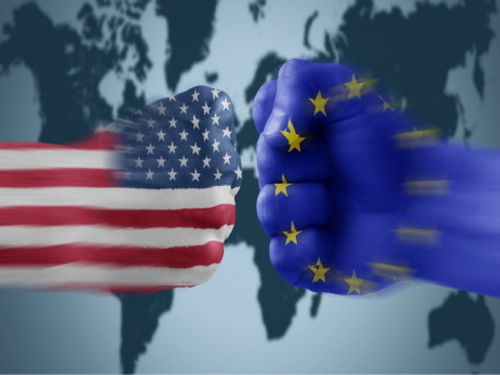While the US officials continue to claim that the US-Europe alliance is functioning as usual, the fact that the post-World War Two arrangement is falling apart is becoming evident with each passing day. This was pretty obvious at the latest Munich security conference. While this even has traditionally the current administration… For we know that this shift began a while ago, and it will continue even after this administration.”
France, very much like Germany, made a clearly dissenting note when its president said, while clearly countering Mike Pompeo’s assertions with regards to the ‘West’s victory’, that the US is actually doing “a rethink of its relationship with Europe”, adding further that the European continent must take ‘its destiny’ in its own hands.
The division rests significantly on how to handle China. Whereas the US policymakers have been reiterating warnings against allowing Chinese telecoms firm Huawei any role in 5G technology, countries like even Britain, otherwise considered to be the US’ closest ally, recently announced that it would allow Huawei to build parts of its 5G mobile network. The decision was taken despite the US officials spending months lobbying against it.
For instance, in the last week of January 2020, some US Congressmen wrote to the members of the British National Security Council to urge them to bar Huawei from playing a role in their next-generation telecom networks. Their letter clearly said that “The facts on Huawei are clear. We hope that your government will make the right decision and reject Huawei’s inclusion in its 5G infrastructure.” Earlier in the second week of January 2020, a US delegation presented the UK with ‘new evidence’ claiming to show security risks posed by using the Chinese firm. None of this has worked of course to wean Britain away from China.
Even in the Munich conference, it became evident that the EU leaders do not share the US idea of China as an enemy. Therefore, the US attempts at manging global issues through unilateral confrontation— be it with Russia and China or Iran and Venezuela — are increasingly failing to strike a chord with Europe, the majority of whom are averse to any form of confrontation, least of all with Beijing. “We cannot be the United States’ ‘junior partner,” said Macron, citing recent failures in the West’s policy of defiance. German Foreign Minister Heiko Maas echoed the sentiment, warning that China and Russia were ascendant in a new world order where the United States is taking a more confrontational role.
For Europe, confronting China and Russia is increasingly pointless. For one thing, despite decades of confrontation and so-called ‘containment’, the US/West has not been able to really contain either of the two powers. On the other hand, it is the very failure of the policy of containment that is pushing the US towards even more confrontation. For Europe, Russia and China are increasingly becoming important centres of global decision making. “Decisions about the future of the Middle East are made in Astana or Sochi instead of in Geneva or New York,” said German Foreign Minister, referring to the capital of Kazakhstan, now known as Nur-Sultan, and the Black Sea resort of Sochi in Russia.
With the Munich conference thus ending on an even increasing divisions within the West, it is becoming increasingly possible that the US dominated world is dying and there is an increasing acceptance of Russia and China as countries that can be worked with and, in fact, looked towards for investment and new security arrangements—something that shows that the disintegration of the transatlantic alliance is not merely a result of the Trump administration’s policies; it is a result of the changing global geo-political dynamics.
More specifically, it is the inevitable rise of China and Russia that is making it extremely difficult for Europe to remain locked in the binary of East-West rivalry when the world has already become multipolar. Europe’s assertion of its “sovereignty” is only an expression of its own transformation from a US ally to one of the multiple ‘poles.’
Salman Rafi Sheikh, research-analyst of International Relations and Pakistan’s foreign and domestic affairs, exclusively for the online magazine “New Eastern Outlook”.





 del.icio.us
del.icio.us
 Digg
Digg
Les commentaires sont fermés.